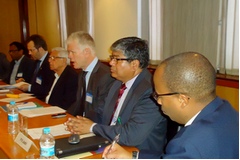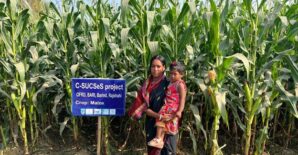
IFPRI-CUTS Workshop in New Delhi
Over the years, food and nutritional security has been a major concern in the development agenda. The multidimensional food security stands on food availability, its access and absorption and has been interlinked with rising effects of climate change, trade movements, prices, policies etc.
IFPRI-CUTS organized a one day workshop on Food Security in India: The Interaction of Climate Change, Economic Politics and Trade (FOODSEC) on March 11, New Delhi. The major objective of the workshop was to discuss and explore possible effects of climate change on agricultural production in India and to understand effects of changes in food entitlements on household food security.
The signs of climate changes are visible through drought and floods in the Indian agriculture. Between 1876 and 2009 India experienced a total of 40 droughts of which 24 occurred until the mid-1960s, and 16 occurred between 1965 and 2009. In the latter period, five droughts were of severe droughts. Research estimates climate change will reduce yields in many regions by 5-25 percent and may increase yields in some by 2050. P S Birthal, NCAP suggests the introduction of technologies such as laser land levelling, Zero tillage, SRI, directed seeding are other options to improve water use efficiency. He also underlined the need to increase the scope of information to farmers on crops, inputs and technologies. Siwa Msangi, IFPRI stresses the need to explore the recharge possibilities and reduce overdraft of the ground water, and also capture the effect of climate change on livestock.
Income and stable food prices plays a significant role in food security. Expanding markets via exports, improved supply chain and safety net program can help to improve food security at national and household level. A Ganesh-Kumar, IGIDR points that ensuring open and stable trade policy, technological support to boost productivity, safety nets for consumers and producers and insurance for handling risks are few parameters to achieve broad base food security.
With food security in the top policy agenda India’s National Food Security Act that aims to secure two-thirds of the 1.2 billion Indians with subsidized food to 75 per cent of the rural population and 50 per cent of the urban dwellers through the Public Distribution System (PDS) is debated time and again on its implementation strategy. Experts stress the gaps in program through distribution channels, corruption, lack of effectiveness in targeting the poor, and wastages etc. that could derail the program in long run. Examples from successful state run program can help in streamlining the program in long run.
The project is supported by The Research Council of Norway. The workshop was well participated by researchers, donors, private sector and government. Dr. Vijay S Vyas, Member, Prime Minister Economic Advisory Council presented the key note address. Havård Hugås, Counsellor, Royal Norwegian Embassy presented the importance of India-Norway Collaboration. Abhijit Sen, Member, Planning Commission chaired a session.
Related blog: Food Security, Climate Change and Trade: Indo-Norwegian research project


